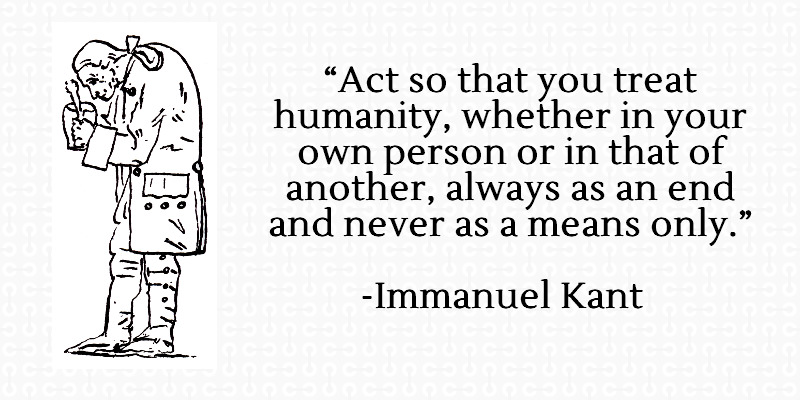The classical concept of natural rights is more or less synonymous with the concept of human rights or moral rights. Rights are essentially claims against others to be treated in certain ways.Natural rights differ from conventional rights, which are rights created by people in a social, legal or political context.
Normative ethics, also called moral theory, is broad field of philosophical study about how we should live or behave. Natural Rights based ethics represents a cohesive and common sense normative position which upholds a necessary respect for human dignity.
We have natural or moral rights by virtue of being human. For this reason, natural rights are sometimes referred to as inalienable or absolute. Human beings have dignity, and thus we all have the inherent right not to be killed, raped, coerced, or stolen from.
The Categorical Imperative and the Basis For Natural Rights
Certain negative moral constraints, including refraining from theft, rape, murder, and so forth are considered prima facie, meaning that the legitimacy of the constraint is accepted “on its face.” The natural right of humans not be murdered, raped or stolen from, are essentially prima facie rights which almost no one disputes.
Such an understanding can be based on Kant’s famous Categorical Imperative, “Act so that you treat humanity, whether in your own person or in that of another, always as an end and never as a means only.”
Kant thought that moral duties depend on a basic human rationality. He considered this rationality the highest principle of morality. The categorical imperative is the basic form of the moral law. We must act with respect to it in order to be moral.
Natural rights ethics give rise to a consistent moral code of conduct for how one ought to live without violating anyone's rights. The obvious moral code of conduct based on natural rights ethics is straightforward, which I broke down previously in my post How to Tell Right From Wrong in 10 Seconds or Less. As a rational human being, you have inherent rights, and you also have a moral obligation to refrain from murder, theft, rape, or coercion in your interactions with others.
Political Ramifications of Natural Rights Based Ethics
However, there are also certain inevitable conclusions about government which cannot be separated out from natural rights based ethics. If natural rights conflict with conventional rights accorded to individuals by the laws of the state, then the morality of the state can sometimes be called into question.
Political philosophies based on natural rights ethics includes deontological liberalism, which is also known as natural-rights libertarianism, or philosophical libertarianism. I’ll use the terms deontological liberalism and natural-rights libertarianism interchangeably in this post.
The philosophy holds that the government has no more right to murder, coerce or steal than and individual does, and since these actions are categorically wrong for individuals, they are wrong for the state as well.
Deontological liberalism is an attractive political philosophy both because of the balanced position of concern for the rights of others which it represents, and because of the logical consistency of the arguments put forth by Robert Nozik in particular.
Nozik’s position is well laid out in his seminal work, Anarchy, State and Utopia. In the first line of the book, he states, “Individuals have rights, and there are things no person or group may do to them (without violating their rights).”
I’ll stop my commentary here, because the aim of this blog is not to address large abstracts like government, but rather to focus on personal conduct and individual solutions for personal growth.
However, with regard to critical thinking, there is one caveat I might as well address.
A Trap For the Mind
This is exactly the type of knee jerk reaction that I myself try to avoid, and that I do not wish to convey through my writing.
The terms left and right have been applied to political philosophy historically, but it is important to note that they are amoral in and of themselves. How left or right something is says absolutely nothing about morality.
The left-right political spectrum represents a kind of dualistic trap for the mind, which implies that there are only two extremes of political thought, represented by fascism on the far right, and authoritarian communism on the far left. A linear left-right political scale says nothing about how moral, stateist, or anti-authoritarian a government is, so the scale is incomplete at best, and false at worst.
Interestingly, the words liberal and libertarian both come from the same root word in Latin, liber, which means free, independent or unrestrained, and libertas, which means freedom. Classical liberalism is the same thing as today’s libertarianism. In contemporary American politics however, the terms have unfortunately come to represent what are in some ways, opposing ideologies.
A Code To Live By
~
Related Posts:
Reconciling The Subjectivism/Objectivism Distinction in Meta-Ethics
Basic, Common Sense Ethical Principles That You Need To Know
How To Tell Right From Wrong In 10 Seconds or Less










